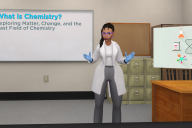You have /5 articles left.
Sign up for a free account or log in.

Apple
When a new corporate-sponsored academic program is being rolled out at 30 community colleges, it helps that the colleges already have instructors who would describe themselves as "fanboy" or "diehard fan" of the company. Apple, it seems, commands such enthusiasm.
“The Apple brand is still really attractive” in higher education, said Bryan Alexander, ed-tech futurist and founder of Bryan Alexander Consulting, a firm that helps higher ed institutions stay abreast of technological developments. But instructors aren't just wowed by the brand; so far, they're also impressed with the corporation's handling of a major new educational initiative.
App Development with Swift is a two-semester course designed by Apple engineers and educators to teach students the elements of app design using Swift, Apple's popular programming language used worldwide. Students will learn to code and design fully functional apps, which Apple and community college officials say will help them gain critical job skills in software development and information technology. Each institution decides how to incorporate the class into its overall curriculum.
The course was announced for six community colleges in May, and 24 more were added to the list last week, heralded by a splashy launch event at Austin Community College featuring Apple CEO Tim Cook.
“Community colleges are fantastic places for people to learn practical skills for work," Alexander said. “That’s always been one of their functions and this is a great way for them to connect to a real burgeoning industry.”
Opportunities and Challenges Ahead
Expert observers see Apple’s latest educational foray as an example of the positive effect a tech company can have on community colleges, many of which gain a reputation boost from working with the well-liked Apple.
While there’s potential for the appearance that a massive corporation now has a hand in the community college curriculum, tangible negative impacts on campus are unlikely, according to Trace Urdan, an independent analyst who specializes in for-profit education and technology issues.
“Community colleges are considered to be vocational. Employment-oriented training is pretty much what they do,” Urdan said. “It’s hard for me to imagine anybody getting upset with them.”
Indeed, officials from community colleges offering the course this fall report that Apple has been hands-off.
.jpg) “They’re providing us the curriculum but they’re not telling us how to use it,” said Garry Gaber, department chair of game design, animation and motion graphics at Austin Community College “They don’t want to know how we use it.”
“They’re providing us the curriculum but they’re not telling us how to use it,” said Garry Gaber, department chair of game design, animation and motion graphics at Austin Community College “They don’t want to know how we use it.”
App Development with Swift is an extension of Apple’s existing K-12 Everyone Can Code curriculum. Swift is Apple’s programming language that company officials say allows coders to easily create app software. Websites including Airbnb, Kayak, TripAdvisor, Venmo and Yelp used Swift to create their apps.
“We’ve seen firsthand how Apple’s app ecosystem has transformed the global economy, creating entire new industries and supporting millions of jobs,” Cook wrote in a statement. “We believe that same opportunity should be extended to everyone, and community colleges have a powerful reach into communities where education becomes the great equalizer.”
Community colleges in general have faced declining enrollment in recent years. Technical programs represent a potentially fruitful path to winning back students, Alexander said.
In some circles, according to Urdan, Apple’s work with community colleges represents an attractive alternative to commercial providers of coding boot camps, which often cost more and limit opportunities for students with financial challenges. Proponents of coding boot camps, however, argue that they add value to a college degree.
Getting Acquainted With the New Normal
Community college officials touted Apple’s project as an innovative and efficient addition to their course offerings that would entice more students to take programming classes and set up those students more effectively for a wide range of professional opportunities.
At some institutions, instructors are just now getting acquainted with the Swift course. At Austin, for example, Gaber only found out about the Apple initiative last week.
“It was pretty whirlwind,” he said.
Training at Austin lasted only half a day and consisted largely of Apple officials walking instructors through the basics of Swift. “To call it training may be a little generous. It was much more of an introduction,” Gaber said.
The course at Austin will begin through the continuing education division on Oct. 24 with up to 22 students. Courses will be offered for credit towards a certificate or associate's degree in the spring. If there’s high demand, more sections might be added later on, according to a college spokesperson, and instructors will also receive more in-depth training in the coming months.
Curriculum development at Northeast Mississippi Community College began in January; the most difficult task was aligning the new courses for the college's associate of applied sciences degree with the existing course numbering system, according to Jeffrey Powell, technology specialist and coordinator of the college’s One to One Initiative. Instructors there said any more training would have been superfluous because Swift is “English readable” and therefore lacks the learning curve inherent in other languages. Natasha Lewis, information systems technology professor at Northeast Mississippi said the tech giant’s programming language Swift is the easiest one she’s ever taught.
Northwest Kansas Technical College also is offering the Swift curriculum, extending its relationship with the company that goes back several years. First the community college outfitted all of its computer labs with Macs, followed later by issuing iPads to faculty members and requiring all students to buy them. Northwest Kansas is offering the Apple course as part of its associate’s degree in app development, though students can get a certificate in app development after one year as well.
Financial aid contributions from the community and alumni helped students purchase iPad devices as part of their tuition. Apple trained professors on using iPad-specific programs in the classrooms, and students use the devices to complete, enhance and present various projects.
This college has been teaching its Swift course for several years, largely to its high school student population. The new material from the current Apple initiative will inform the existing course, according to Jeremy Skrdlant, mobile app instructor. “Programming with Swift has been really good at teaching kids how to code,” Skrdlant said.
Observers believe Apple and other tech companies will be sticking around in the community college landscape. More programs like this one could very well be on their way.
“In the tech world, giant companies have enormous wealth and cultural cachet and a lot of mindshare,” Alexander said. “It’s kind of hard to avoid them.”







